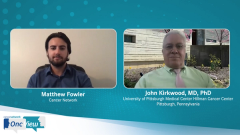
Taking Drug Holidays Amidst Melanoma Therapy
Dr John Kirkwood explores the idea of taking drug holidays during melanoma treatment and whether it is helpful or harmful.
Episodes in this series

Matthew Fowler: Lastly, I want to transition to other clinical decision points. How do you handle when your patients request a drug holiday?
John Kirkwood, MD, PhD: A drug holiday is an interesting thing. Interruptions in therapy we are all familiar with. Remarkably, whether it’s dabrafenib-trametinib or interferon-alpha, our old immunotherapy, or PD-1, fatigue—toxicity manifest in fatigue—is the single biggest complaint that many patients have. They’re there with targeted therapies, with our old immunotherapy with interferon-alpha, and they’re with PD-1, and that fatigue often leads a patient to ask if they can take a break. The problem is that although the kinetics of BRAF and MEK therapy tell us that if we stop, we can expect the patient to begin to recover in days or a week, with PD-1 the impact may be weeks. The acuity of the fatigue, if that’s the motivation to have a drug holiday, is a little more difficult to rationalize.
The drug holiday notion was—for BRAF/MEK inhibitor therapy, at least—a major concern with the interesting data that emerged more than 8 years ago in mouse models. Intermittent therapy—treatment for 3 weeks and then a week off—achieved superior outcomes in melanoma therapy in the mouse compared with continuous therapy. For a while we thought that interrupted therapies might be superior, at least with BRAF and MEK inhibitors. SWOG did a trial that’s known as S1320 that sadly did not show that interrupted therapy with BRAF/MEK inhibitors did achieve significantly better outcomes.
For the moment, we try to limit the period of time off treatment to improve to ameliorate the symptoms of fatigue or fever that we see with dabrafenib-trametinib. Then we can often resume therapy without attenuation and carry the patient through the period of treatment, especially in the adjuvant setting, where we think doing this has curative potential for patients who we would not want to forsake by dropping the dose or by interrupting it for too long.
Matthew Fowler: You’ve touched on a bit of the clinical investigations going on around this. From what you’ve seen, what can a drug holiday to do the efficacy of a treatment?
John Kirkwood, MD, PhD: If a drug holiday winds up being repeated and associated with dose attenuation, it can lose the benefit that we hoped to gain from the BRAF/MEK inhibitor pair that a patient is being treated with. On the other side, when it’s done judiciously and allows the patient to stay with therapy through the entire prescribed period of treatment—say, a year of adjuvant therapy—the hope is that interruptions, not wholesale and not for long periods of time, may allow the patient to complete therapy that they otherwise would not be able to complete.
This transcript has been edited for clarity.
Newsletter
Stay up to date on recent advances in the multidisciplinary approach to cancer.





































